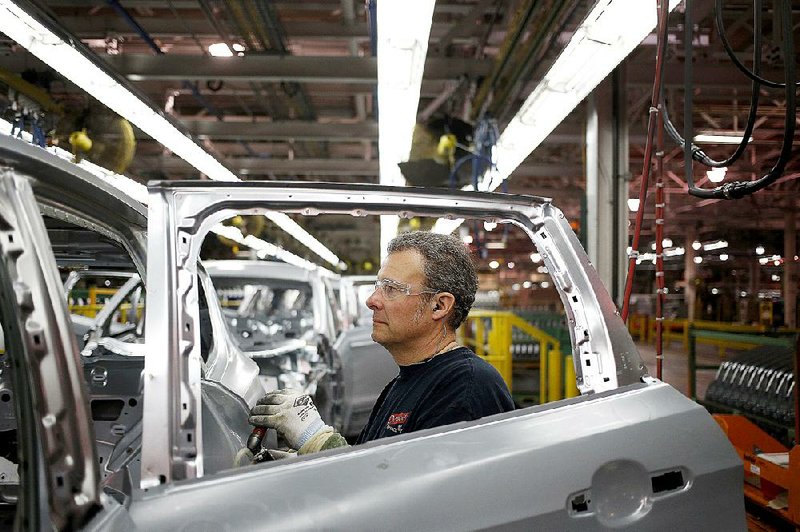Ford Motor Co. Chief Executive Officer Mark Fields, presiding Thursday for the first time over the company's annual meeting, addressed shareholder concern about the company's lagging stock by promising the company is poised for a profit liftoff in the year's second half.
"We're poised for a breakthrough year for our company," Fields told shareholders at the automaker's annual meeting in Wilmington, Del. "We expect our results will grow progressively stronger, mainly in the second half, as the new products that we've been launching start to really pay off."
Fields is working to restore the earnings growth Ford experienced under his predecessor, Alan Mulally, who retired last year after engineering a turnaround for the automaker. Fields has said pretax profit will grow as much as 51 percent this year as the new, aluminum-bodied F-150 truck reaches full production. Net income fell 56 percent last year to $3.19 billion as Ford introduced a record 24 new models, and turmoil in Russia and South America contributed to wider international losses.
"We're not thrilled that the stock hasn't moved in a year or two, but we think they're doing the right things," said Michael Levine, a fund manager at Oppenheimer Funds Inc. in New York, who said Ford is the fourth-largest holding in the $6.4 billion equity income fund he manages. "When Fields came in, the Street probably underestimated some of the costs in transitioning from the old F-150 to the new one."
Fields, 54, become CEO last July 1.
At the meeting, two shareholders noted Ford's stock has lagged behind the S&P 500 for the last one, two, five and 10 years.
"I continue to be disappointed in Ford's stock price and low capitalization in this historic United States bull market," Roger Heymann, a shareholder from Rockville, Md., told Executive Chairman Bill Ford. "When will we see an increase in Ford profits? Toyota had record profits. Ford's stock price can't increase without larger profits."
Bill Ford said, as a significant shareholder, he monitors the company's stock price daily, "if not hourly."
"In 2015 we're on track to have a very good year," Ford said. "If people are paying attention, I believe the stock price will take care of itself."
After initial buyers of the F-150 snapped up fully loaded models in the first quarter, Fields last month raised his operating profit margin forecast for Ford's North American unit to 8.5 percent to 9.5 percent. He has said the company will post pretax income this year of $8.5 billion to $9.5 billion.
"We're mostly through the launch of the F-150," Fields told analysts on Feb. 28 after posting a first-quarter profit that fell 6.6 percent to $924 million. "As we get into the second half of the year, we're seeing really great acceptance of our new products."
The F-Series, including larger versions such as the F-250, accounts for 90 percent of the Dearborn, Mich.-based company's global automotive profit, according to Morgan Stanley.
F-Series sales in the U.S. rose 1.4 percent in the first four months of 2015 after falling 1.3 percent last year. The truck was the nation's top-selling vehicle for the 33rd straight year in 2014. The new F-150's fuel economy increased as much as 29 percent, primarily because the aluminum body trimmed the pickup's weight by about 700 pounds.
Ford lost output of more than 100,000 trucks since the start of last year while it retooled two factories that make the model. A plant near Kansas City, Mo., began building the aluminum-bodied F-150 in March.
"It took them out of the game for a while at a time when truck sales have been very, very strong," Levine said. "Long term, the move to aluminum is absolutely the right call. But it's impacted results for the last three quarters and it will impact them for another quarter or two."
Political and economic upheaval in Russia and South America hurt the company's performance in the first year under Fields, a 26-year company veteran who had been chief operating officer and head of North American operations before becoming CEO. Fields received compensation of $18.6 million last year, up 82 percent from 2013 when he was COO.
"He's done a pretty good job on the things he can control," Levine said. "Mulally did a great job shepherding the company through a very difficult period. I don't think things would be materially different if he were still there."
Business on 05/15/2015
